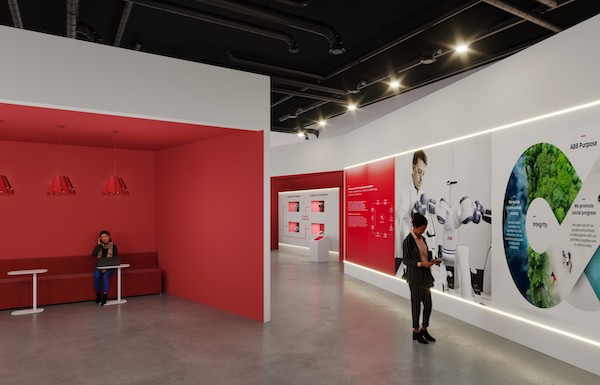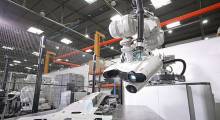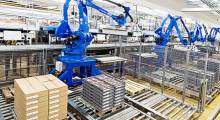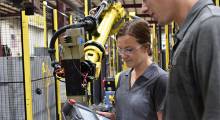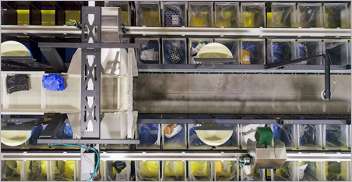ABB today announced that it is expanding its North American robotics headquarters and manufacturing facility in Auburn Hills, Mich. The company said it is investing $20 million in the construction project, which it said will create 72 skilled jobs and will be completed in November 2023.
“Our investment is a significant step in accelerating ABB Robotics’ global leadership in developing and manufacturing cutting-edge robotic solutions in the U.S., for the Americas,” stated Sami Atiya, president of ABB Robotics and Discrete Automation.
“As the global mega trends of labor shortages, uncertainty, the near- and reshoring of production, and a desire to operate more sustainably accelerate, more businesses are turning to automation to build resilience while improving efficiency and flexibility,” he added. “Our expanded facility will help us to better serve customers in the U.S. and across the Americas, giving them access to innovative automated solutions.”
ABB to automate its own production
ABB said it plans to use the latest technologies to make its next-generation robotics, streamlining the delivery process and reducing lead times. The plant will use flexible, modular production cells that are networked and served by autonomous mobile robots (AMRs), noted the company, which acquired ASTI Mobile Robotics in 2021.
Robots will take on tasks such as screw driving, assembling, and material handling, freeing people for more rewarding work, it claimed.
“The expanded facility will feature the most advanced technology available, with AI-enabled robots and smart digital manufacturing systems,” said John Bubnikovich, president of the ABB U.S. Robotics Division.
“We're really focused on the localization of manufacturing to increase productivity and to incorporate new technologies into our processes,” he told Robotics 24/7. “We delivered about 80% of what we sold in the Americas from this factory last year.”
Close to 90% of the robots delivered to customers in the U.S., Canada, and Mexico, as well as in South America, will soon be made in Auburn Hills, said ABB. It expects to initially increase production by about 30%, said Bubnikovich.
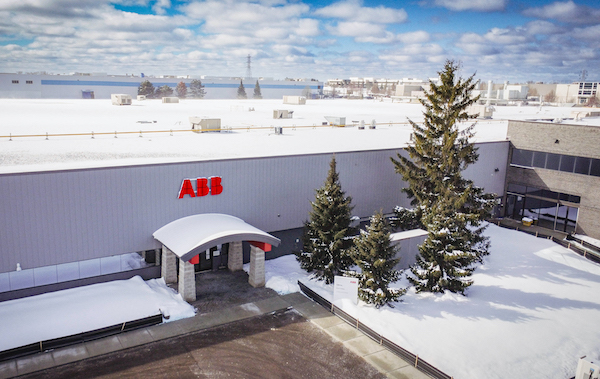
Robust robotics demand in the Americas
While none of the top industrial automation vendors are based in the U.S., ABB noted that it was the first global robotics company to commit to a North American presence. It moved into the 538,000-sq.-ft. building in 1993 and opened its manufacturing plant in 2015.
Zurich-based ABB said it has already invested $14 billion in the U.S. since 2010. The company said the expansion of its headquarters and factory will benefit customers in the Americas, particularly those in growing sectors such as electric vehicles (EVs), healthcare, packaging, and logistics.
With 70% of U.S. businesses looking to bring production closer to home, according to ABB Robotics' survey of 1,610 U.S. and European executives in June 2022, the increased production capacity will help the company respond to the demand for automation.
“While we see some softness, the markets are still expanding—look at the past two years of record robot sales, according to the International Federation of Robotics,” Bubnikovich said. “We're building manufacturing with the ability to scale with regional growth. The reason we started manufacturing here in 2015 was to balance production globally.”
SMEs need application expertise
“Ten years ago, only the companies with the deepest pockets and the most engineers—like in automotive—drove automation,” observed Bubnikovich. “The big shift is that the costs of cameras and robots are going down, and they can operate in areas once thought of as unstructured, like picking and sorting.”
“With SMEs [small and midsize enterprises] entering the market, customers need to have confidence in expert support from an application perspective,” he said. “The go-to-market strategy at ABB has four levels: the base robot, the robot with peripherals, robotic cells, and bespoke systems.”
ABB relies on channel partners to serve the market, but it can go directly for specific needs that distributors and integrators can't meet, he noted.
“For example, a consumer packaged goods customer may want to replicate a workcell around the world,” explained Bubnikovich. “For that, we might go direct to provide more value than just the robot.”
ABB is “building competence” in the EV space, but there are also opportunities in electronics, pharmaceuticals, and general industry, he said.
“We see a ton of opportunities for SMEs with collaborative applications,” Bubnikovich added. “It's all about the ease of integration, not people handing parts to a welding robot, and there's a huge shortage of skilled labor like welders.”
“Modern applications incorporate ease of use, the right price point for small customers, and robots that they can understand and build into their operations,” he asserted. “We're getting there. There's still some vertical integration to do with our supply chains to be more responsive, and there's a shortage of integration skills.”

Michigan anticipates job growth
ABB already has about 350 employees at Auburn Hills. The expansion will create jobs supporting ABB Robotics' Packaging & Logistics headquarters in Atlanta and its Robotics Lifesciences and Healthcare Hub at the Texas Medical Center in Houston.
The construction is supported by a $450,000 Michigan Business Development Program performance-based grant, said the company.
“Thanks to companies like ABB Robotics and the support of our local partners, we can keep bringing jobs and investment to every region of our state, revitalizing communities, and building an economy of the future,” stated Michigan Gov. Gretchen Whitmer.
Given shortages of skilled labor, how will ABB itself staff up? While the investment was initially seen as a means to better serve customers, ABB realized that updated facilities could also help it attract talent, Bubnikovich replied.
“We look at this investment threefold,” he said. “First, with smart automation, we're modernizing our team workspaces. Second, we're looking to recruit and retain talent with Auburn Hills as the epicenter. Third, we're building a world-class demonstration center for customers and partners to showcase our technology.”
ABB also has partnerships with universities and a Discovery Program in which students rotate through different ABB business units.
About the Author
Follow Robotics 24/7 on Linkedin
Article topics
Email Sign Up

